Note: names and genders, as well as details of medical facilities, have been altered to protect the identities of those mentioned in this article.
Time is still suspended in these halls. Without discretion, their glazed eyes slowly opening and closing and not registering any stimuli, those of us who were not citizens of these halls floated by. The citizens of this place held neither passports for the land of the living nor that of the deceased. They resided in the land of the moribund, where uncertainty lurked behind every shadow. Some were more aware than others. Some only reacted to extreme forms of pain. This unfortunately meant they were screaming with every bowel movement, diaper change, attempts to speak, or to cough as gently as possible. These humans had lived dignified lives before they were admitted to the emergency ward of these modern hospitals.
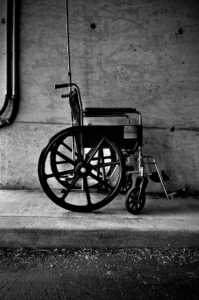
In these halls in particular, they were all women who had raised families with varying degrees of success. The healthcare workers assigned to these halls judged their patients’ level of success by how many and how often these women had visitors. As these visitors themselves nodded in and out of consciousness at the foot of the beds of their loved ones, they would see the sudden glow of the Apple Watches worn by the nurses as they worked silently and diligently with a patient across the room.
The visitors had a new relationship with time. Due to the pandemic, in these halls their time was limited and heavily restricted. They were tourists whose stay was only tolerated for a small period of time each day. Few glanced at their watches. Fewer glanced up towards the wall clock which no matter what, no matter in which hospital, was always 3-4 minutes ahead. They were counting down to whether they should bother waking up their loved ones to potentially say goodbye for the last time, again.
In what seems like a lull of the COVID-19 pandemic thanks to the less severe Omicron variant asserting its dominance, it is painfully obvious that we took a lot for granted in “the before times.” Besides not appreciating the ability to go almost anywhere we pleased without risking contracting and spreading a potentially deadly virus, we also had our conventional relationship with time itself severed. The first month of the pandemic felt like an entire season. After March 2020, people lost track of which day it was as world events moved from one crisis to another at a frightening pace. They broke daily routines by working from home. Many lost their jobs. At the time of writing, the memories of most have become anxiety-ridden and a blur hard to decipher in the present.
The importance of having a legible watch or a clock with the date easily at hand gradually became more important for many. Those who continued to have a privileged life where they could have a casual relationship with time as they wound down the work day are not the focus of this article; those who fell ill or who had to take care of others are, as are the millions who now had to juggle one or more careers while taking care of their children during work hours. The need for telling, and more importantly, tracking time mattered more than ever.
Time was suspended in these halls, and this protraction brought horror. The cool glow from the hospital’s ancient CRT televisions enveloped their world with a sense of terrorizing insignificance. As they viewed the unmasked insurrection of the US Capitol building, and as they viewed Canada’s parliament being taken over by anti-COVID and mask mandate protestors, these immune-compromised individuals only heard one depressing message.
Your life does not matter.
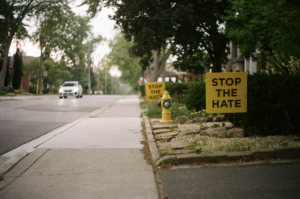
Viewing a changing and horrifying world from forced isolation easily took its toll on our most vulnerable.
Pandemic or not, life marched forward, and at an accelerated pace. If there was any sort of emergency, its level of anxiety was amplified due to fears centred around contracting the virus. All senses were heightened at the cost of sleep and a debilitated access to rational thought as they dodged potential exposures. Access to voting booths, vaccination appointments, and medical facilities in general were limited due to very strict appointment windows. This, coupled with coming out after a period of isolation in an uncertain and unrecognizable world, required precision.
Where all precision lost meaning was for those who were forced to be hospitalized during the pandemic.
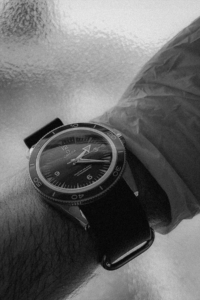
During these many months, this watch and its dive bezel proved critical in timing events longer than an hour which needed constant attention.
Time was still suspended in these new halls as well. It did so for some at their detriment. Time (at this stage unbeknownst to them) was vital at this critical stage in their lives. Rehabilitation hospitals are common stops for those who have once again taken ownership of the passport designated for the living. The government only covers their stay at such a place for a brief time. Some still live in a reality that is covered by a thick fog and uncertainty. Without being able to track time, or the day, there are daily instances where these vulnerable people are forced into tears.
“You have to get better,” yelled the administrative floor manager. “You have to get up and walk!”
The person I was visiting that day and I listened in disbelief through the privacy curtain. Having personally witnessed his level of trauma and slow recovery, we were amazed at how clueless this manager was as to his condition. My friend purposefully spoke in a loud voice to me, but mainly to get the attention of the rude manager.
“There is no chance that he can walk before his discharge date. That poor man broke both his hips, both his knees, fractured multiple vertebrae, and he fell directly on his throat onto the ledge of a chair!”
Hearing this, my friend’s roommate struggled to speak with his severely injured throat. The manager got flustered and left for she knew that her target had allies in these halls, allies who had resources and lawyers on call, at the ready to ensure the well-being of those we cared for.
These seniors who were hospitalized due to severe trauma faced an unexpected struggle ahead. Typically their first few days in their new environment are filled with confusion. Depending on the severity of their trauma, due to having less staff because of the pandemic, this new unfamiliar setting became not only intimidating, but frightening and lonely. With staff and visits from family and friends being highly limited, the patients were forced to lie on their backs and doze in and out of consciousness. Some in these halls had their mental faculties degrade. Speaking with their loved ones on elevator rides up and down, I witnessed husbands coming to tears as they confided in no longer being able to recognize the person who was once their wife. Unprovoked outbursts from patients in other rooms not only startled the patients who still had their mental faculties, but it also frightened them on a personal level. In these other patients, they saw future versions of themselves. Thoughts and inward pleas of dying in their sleep started taking precedence over any other thoughts whenever their visitors would leave.
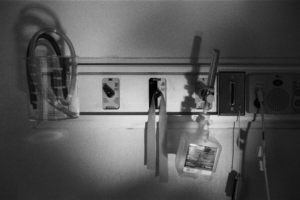
We tried our best to not make eye contact. My relative and I listened while gazing out the window of the common area. This area had been converted to the dining space for the floor due to COVID-19 restrictions, and we took opportunities to visit it and its view on offer during off-peak hours.
“Where am I supposed to go,” she pleaded. “I still cannot walk. I still cannot go to the washroom by myself.” Her efforts to hold back her tears had long given way by this point. The highly empathic and helpful social worker could only shift his gaze towards his feet in defeat. What was especially crushing about this patient was her age. The average age for those in these halls hovered in the mid-seventies. She was in her early fifties. Though she was heavily battered from her vehicle accident, she spent the previous month and a half using her relatively youthful energy traversing the halls slowly in her wheelchair. She made the effort to greet everyone who passed with a smile. Her striking blue eyes became a highlight for everyone fortunate enough to be greeted by them.
Time was stalled in these halls, only to overwhelm and drown those within them when the abstract dam broke. In another hospital, while visiting another person I care deeply for, I once again overheard another patient as she grasped her time in these halls.
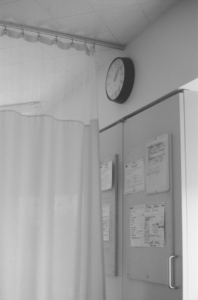
“It was almost yesterday I got here. I got no one who can help me. All of my family lives on the other side of the country.” Her whimpering voice was so dampened by her tears that it refused to echo off of the hard hospital surfaces.
“I hear what you are saying, but I am here to help you navigate your health care options that are available to you,” he replied gently.
“Then why was I only approached two weeks before my discharge date and told to start planning to leave.” Her voice now thundered across the entire floor as her beautiful blue eyes now fueled with rage took the breath out of not only the social worker’s lungs, but that of ours as well. As the kind social worker struggled to find a response, she continued.
“The first five weeks of my stay I was barely awake! The clock in my room is on the other side of the privacy curtain! I never know what time or what day it is! Why are you doing this to me?!”
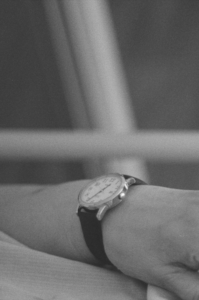
Due to their aging eyesight and at times very bad placements of the clocks in their rooms, the passage of time became confounding and frustrating for those who resided within these halls. With almost all sense of agency and control taken away from them as they recovered, having their sense of time stolen seemed unnecessarily cruel. As a result, I received desperate requests for an affordable and legible watch. Furthermore, I was asked to find a good and legible clock for their home.
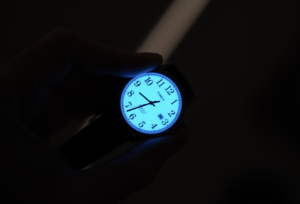
On top of the thousands of tasks related to their health, my search for an appropriate watch and clock was incredibly easy. Searching beyond the usual suspects of Casio and Timex was not needed, as Timex’s Easy Reader was and is still to this day perfect. Having all of its 38mm dominated by its highly legible dial that also could be lit at night with its INDIGLO® system made this the prime candidate for a wrist watch for seniors. Its size also made it a great tabletop tray clock. Though this watch is offered in many different colours, the white dial offered the best classic design and legibility. The cheap leather strap that is often the main point of negativity with this watch has not raised any concerns a year onwards.. These watches are still in use today, and by various members of their households.
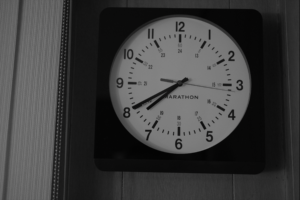
The clock was just as easy to narrow down. Marathon makes a terrific wall clock that is available in black or white. This twelve-inch clock also has a light that automatically, and more importantly for these owners, gently turns on when the room becomes dark. Its sweep seconds hand is also silent, making this the ideal clock for households that value silence. It is a little pricey at slightly over $100 Canadian, but it is well worth it as it is relied upon during late nights.
Having regained their agency over their lives, these beautiful yet vulnerable souls no longer had to rely on a nurse’s availability to do something. As the months have progressed and that they are now back home and fully recovered, they all carefully plan their activities throughout the day. These two tools play a vital role in their day going smoothly, and I am eternally grateful for their continued and reliable use.
It was not only time which was suspended in these halls, but smells as well. On each floor, these halls had a designated room where everyone’s refuse and diapers were collected. The smell of manure when collected from a wide assortment of dilapidated digestive systems that all shared the same diet resulted in something that required months of professional training to get accustomed to. In these halls, the lingering odour of manure took on a life of its own. These halls smelled like freshly baked burnt cigarettes and rotting beef. During their rehab exercises, patients did their best to avoid that room.
On his last day, another friend of mine decided to say goodbye to the sweet young social worker who had become a close friend in his last few days at the facility. As I pushed his wheelchair out of his room for one final time, he comically smiled and said, “Don’t you dare take me past that dreaded room!”
After we had said our goodbyes to all the nurses, cleaning staff, and the welcoming high school students who were tasked with the responsibilities of screening visitors for any COVID-19 symptoms, my friend looked down at his Timex.
“We’re making good time,” he said briefly taking off his mask. “I forgot what fresh air smelled like. I can’t believe I endured that shit for so long and lived to tell my friends about it.”
Now, time is no longer suspended. It ranges in its pace from painfully slow nights to a flurry of hours disappearing. But what matters is that time is now tracked. It is noted. It is relied upon. It is used to directly improve the quality of life. The act of telling time allows for the most basic forms of agency to be had, and for a hopeful future to be built.
Telling time matters, for it materializes one’s horizons and the all-important hope needed to want to keep living.
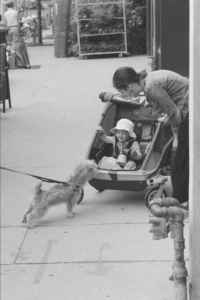
For everyone who helped and was a part of this article, thank you.